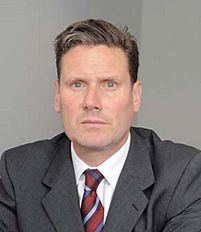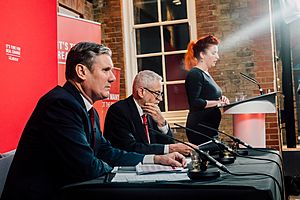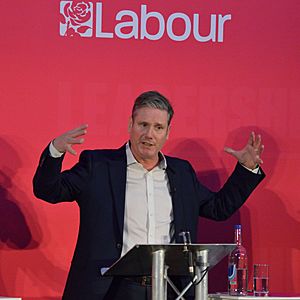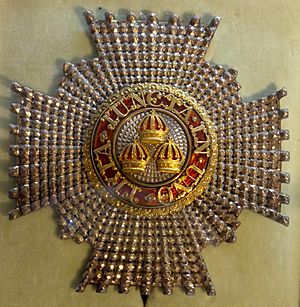Keir Starmer facts for kids
Quick facts for kids
Keir Starmer
|
|||||||||||||
|---|---|---|---|---|---|---|---|---|---|---|---|---|---|
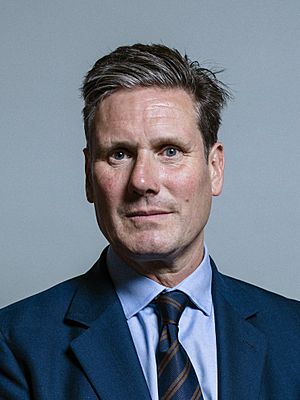
Official portrait, 2017
|
|||||||||||||
| Leader of the Opposition | |||||||||||||
| Assumed office 4 April 2020 |
|||||||||||||
| Monarch | |||||||||||||
| Prime Minister | |||||||||||||
| Deputy | Angela Rayner | ||||||||||||
| Preceded by | Jeremy Corbyn | ||||||||||||
| Leader of the Labour Party | |||||||||||||
| Assumed office 4 April 2020 |
|||||||||||||
| Deputy | Angela Rayner | ||||||||||||
| General Secretary |
|
||||||||||||
| Chair |
|
||||||||||||
| Preceded by | Jeremy Corbyn | ||||||||||||
|
|||||||||||||
| Member of Parliament for Holborn and St Pancras |
|||||||||||||
| Assumed office 7 May 2015 |
|||||||||||||
| Preceded by | Frank Dobson | ||||||||||||
| Majority | 27,763 (48.9%) | ||||||||||||
| Director of Public Prosecutions | |||||||||||||
| In office 1 November 2008 – 1 November 2013 |
|||||||||||||
| Appointed by | The Baroness Scotland of Asthal | ||||||||||||
| Preceded by | Ken Macdonald | ||||||||||||
| Succeeded by | Alison Saunders | ||||||||||||
| Personal details | |||||||||||||
| Born |
Keir Rodney Starmer
2 September 1962 London, England |
||||||||||||
| Political party | Labour | ||||||||||||
| Spouse |
Victoria Alexander
(m. 2007) |
||||||||||||
| Children | 2 | ||||||||||||
| Education | |||||||||||||
| Signature | |||||||||||||
Sir Keir Rodney Starmer KCB KC ( born 2 September 1962) is a British politician and barrister who has served as Leader of the Opposition and Leader of the Labour Party since 2020. He has been Member of Parliament (MP) for Holborn and St Pancras since 2015. He was previously Director of Public Prosecutions from 2008 to 2013.
Contents
Early life and education
Starmer was born in Southwark, London, on 2 September 1962. He grew up in the small town of Oxted in Surrey. He was the second of the four children of Josephine (née Baker), a nurse, and Rodney Starmer, who was a toolmaker. His mother had Still's disease. His parents were Labour Party supporters, and named him after the party's first parliamentary leader, Keir Hardie. He passed the 11-plus examination and gained entry to Reigate Grammar School, then a voluntary aided selective grammar school. The school was converted into an independent fee-paying school in 1976, while he was a student. Although he was exempt from paying fees until the age of 16, his sixth-form study fees were paid by a bursary he received from the private school's charity. Among his classmates were the musician Norman Cook, alongside whom Starmer took violin lessons; Andrew Cooper, who went on to become a Conservative peer; and future conservative journalist Andrew Sullivan. According to Starmer, he and Sullivan "fought over everything ... Politics, religion. You name it."
In his teenage years, Starmer was active in Labour politics; he was a member of the Labour Party Young Socialists in East Surrey. He was a junior exhibitioner at the Guildhall School of Music and Drama until the age of 18, and played the flute, piano, recorder and violin. Starmer studied law at the University of Leeds, graduating with first class honours and a Bachelor of Laws (LLB) degree in 1985, becoming the first member of his family to graduate. He undertook postgraduate studies at St Edmund Hall, Oxford, graduating from the University of Oxford as a Bachelor of Civil Law (BCL) in 1986. From 1986 to 1987, Starmer edited the radical magazine Socialist Alternatives.
Legal career
Starmer became a barrister in 1987 at the Middle Temple, becoming a bencher there in 2009. He served as a legal officer for the campaign group Liberty until 1990. He was a member of Doughty Street Chambers from 1990 onwards, primarily working on human rights issues. He has been called to the bar in several Caribbean countries, where he has defended convicts sentenced to the death penalty. He assisted Helen Steel and David Morris in the McLibel case, in the trial and appeal in English courts, also represented them at the European court. The case was seen as a David and Goliath case; a large team of leading lawyers represented McDonald's and the legal bills were estimated at £10m. By contrast Steel and Morris were denied legal aid; they acted on their own with help from lawyers including Starmer.
Starmer was appointed Queen's Counsel on 9 April 2002, aged 39. In the same year, he became joint head of Doughty Street Chambers. Starmer served as a human rights adviser to the Northern Ireland Policing Board and the Association of Chief Police Officers, and was also a member of the Foreign and Commonwealth Office's death penalty advisory panel from 2002 to 2008. He later cited his work on policing in Northern Ireland as being a key influence on his decision to pursue a political career: "Some of the things I thought that needed to change in police services we achieved more quickly than we achieved in strategic litigation ... I came better to understand how you can change by being inside and getting the trust of people". During this time he also marched and authored legal opinions against the Iraq War. In 2007, he was named "QC of the Year" by Chambers and Partners.
Director of Public Prosecutions
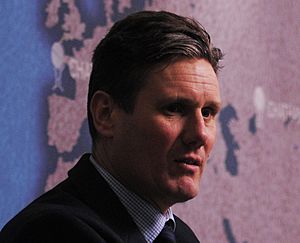
In July 2008, Baroness Scotland of Asthal, Attorney General for England and Wales, named Starmer as the new head of the Crown Prosecution Service (CPS) and Director of Public Prosecutions. He took over from Ken Macdonald on 1 November 2008. Macdonald, himself a former defence lawyer, publicly welcomed the appointment. Starmer was considered to be bringing a focus on human rights into the legal system.
Starmer left office in November 2013, and was replaced by Alison Saunders. After stepping down as Director of Public Prosecutions, Starmer was granted a tax-unregistered pension.
Early political career
Elected to the House of Commons at the 2015 general election, Starmer was appointed Shadow Minister for Immigration by new party leader Jeremy Corbyn in September 2015. He resigned in 2016 as part of the wider June 2016 British shadow cabinet resignations in protest at Corbyn's leadership, but accepted a new post under Corbyn later that year as Shadow Secretary of State for Exiting the European Union following the EU membership referendum. Starmer advocated a second referendum on Brexit, in which he stated he would vote to "remain"; this policy was ultimately included in the 2019 Labour election platform.
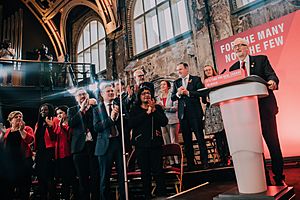
Leadership of the Labour Party
After Jeremy Corbyn resigned following Labour's 2019 general election defeat, Starmer won the party's 2020 leadership election. His leadership has been characterised by movement towards the political centre and abandonment of the left-wing platform of his leadership campaign, as well as by opposition to some of the government response to the COVID-19 pandemic and issues such as Partygate, the September 2022 mini-budget, and the cost of living crisis. Starmer has emphasised the importance of eliminating antisemitism in the Labour Party. In 2023, he set out five missions for a Labour government, targeting issues such as economic growth, health, clean energy, crime, and education. The party has seen varied results in local elections and by-elections under his leadership, but since late 2021 has maintained leads in opinion polling over the governing Conservative Party.
Political positions
Starmer's politics have been described as unclear and "hard to define". When he was elected as Labour leader, Starmer was widely believed to belong to the soft left of the Labour Party. However, he has since moved to the political centre-ground. By the September 2023 shadow cabinet reshuffle, most analysts concluded that Starmer had moved to the right of the party, but with elements of the 'soft left' remaining in the shadow cabinet.
The term Starmerism has been coined to refer to Starmer's political ideology and his supporters have been called Starmerites. In June 2023, Starmer gave an interview to Time where he was asked to define Starmerism:
Recognizing that our economy needs to be fixed. Recognizing that [solving] climate change isn’t just an obligation; it’s the single biggest opportunity that we’ve got for our country going forward. Recognizing that public services need to be reformed, that every child and every place should have the best opportunities and that we need a safe environment, safe streets, et cetera.
Domestic issues
Starmer has repeatedly emphasised the reform of public institutions (against a so-called 'tax and spend' approach), localism, and devolution. He has pledged to abolish the House of Lords, which he has described as "indefensible", during the first term of a Labour government and to replace it with a directly-elected 'Assembly of the Regions and Nations', but the details of which will be subject to public consultation. He criticised the Conservative Party for handing peerages to "cronies and donors". Upon becoming leader of the Labour Party, he tasked former Labour Prime Minister Gordon Brown with recommending constitutional reforms to British democracy. The report was published in 2022 and was endorsed and promoted by Starmer, and recommended the abolition of the House of Lords, greater powers given to local councils and mayors, and deeper devolution to the nations of the United Kingdom.
Starmer supports social ownership and investment in the UK's public services, including the National Health Service (NHS). In 2020, he pledged to increase income tax for the top 5% of earners and to end tax avoidance by corporations, but he backed away from the income tax commitment in 2023. He advocates the reversal of the Conservative Party's cuts in corporation tax and supported Labour's anti-austerity proposals under Jeremy Corbyn's leadership. On social inequality, Starmer proposes "national wellbeing indicators" to measure the country's performance on health, inequality, homelessness, and the environment. He has called for an "overhaul" of the UK's Universal Credit scheme. Opposing Scottish independence and a second referendum on the subject, the Labour Party under Starmer's leadership has set up a constitutional convention to address what he describes as a belief among people across the UK that "decisions about me should be taken closer to me". Starmer is against the reunification of Ireland, having stated that he would be "very much on the side of Unionists" if there were to be a border poll.
Starmer has taken a strong line in favour of green policies aimed at tackling climate change and decarbonising the British economy. Politico has described him as "a green activist to his core" and a "green radical", noting that while many other areas of the broader plan endorsed during his leadership campaign had been abandoned, "The party’s biggest climate pledge remains intact: a bold — some say implausible — commitment to remove fossil fuel power from Britain’s electricity grid by 2030, five years quicker than the Conservative government’s own target", calling him "dogmatic" about the plan. He and his Shadow Chancellor Rachel Reeves pledged in 2021 to invest an extra £28bn a year in green industries if elected; in June 2023 this was changed to £28bn per year by the middle of their first term of government.
On education, Starmer vowed in 2021 to strip independent schools of their VAT-exempt charitable status, a move that has been criticised by the Independent Schools Council, and continues to pledge to do so. During the 2020 Labour Party leadership election, Starmer pledged to scrap university tuition fees, however he dropped this pledge in May 2023 due to a "different financial situation" following Liz Truss' premiership, instead aiming to reform the tuition fee system, stating that "the current system is unfair, it doesn't really work for students, doesn't work for universities." He is supportive of faith schools, stating: "I think it's good that we create strong bonds within schools, and therefore I wouldn't tinker with the way that we run our faith schools." He has ruled out extending free school meals to all primary school pupils in England. Instead, Starmer has pledged to extend breakfast clubs including free breakfasts for every primary school in England.
Starmer's position on public ownership over national infrastructure has changed over time. In the 2020 Labour Party leadership election, Starmer ran on a pledge to renationalise rail, mail, water, and energy back into common ownership; he dropped this pledge in July 2022, claiming he would instead take a "pragmatic approach" to public ownership. As of September 2023, he remained committed to renationalising the railways as existing contracts expire, the creation of a publicly-owned energy company, and stricter regulation of water companies. Starmer favours partnership between government and business, having said: "A political party without a clear plan for making sure businesses are successful and growing ... which doesn't want them to do well and make a profit ... has no hope of being a successful government."
Starmer has pledged to increase confidence in the criminal justice system and create a 'Charging Commission' which would be "tasked with coming up with reforms to reverse the decline in the number of offences being solved." He has also committed to placing specialist domestic violence workers in the control rooms of every police force responding to 999 calls to support victims of abuse.
In 2023, the Byline Times wrote that Starmer "actively opposes a move to proportional representation for the House of Commons". The proposed change to a proportional representation system for the UK Parliament is supported by a two-thirds majority of trade unions that align with the Labour Party and was formally backed by an overwhelming majority of Labour delegates at the party's 2022 party conference. It was revealed in September 2022 that at that point, 370 Constituency Labour Parties (CLPs) had formally passed policy in favour of proportional representation, equating to about 60% of all CLPs in the UK.
After confirming he would not scrap the current two-child benefit cap, Starmer was criticised by many within his own party.
Foreign affairs
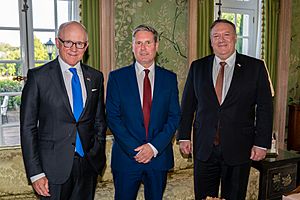
Starmer voted remain in the Brexit referendum and then as Shadow Secretary of State for Exiting the European Union was an advocate for a second Brexit referendum after the process of the UK withdrawal from the EU was completed.
Starmer has advocated an end to "illegal wars" and a review of the UK arms export. During his leadership campaign, he pledged to create a "Prevention of Military Intervention Act", which would only permit lawful military action with the support of the House of Commons.
Starmer said that Israel "must respect international law" and called on the Israeli government to work with leaders of Palestine to de-escalate the Israeli–Palestinian conflict. Starmer opposes illegal Israeli settlements, proposals for Israeli annexation of the West Bank, and "the eviction of Palestinians" in the Israeli-occupied territories; he also opposes the Palestinian-led Boycott, Divestment and Sanctions (BDS) movement promoting boycotts, divestments, and economic sanctions against Israel. Starmer also has expressed support for the creation of an "inverse OPEC" dedicated to accelerating the implementation of renewable energy. He has rejected the contention that Israel is an apartheid state. In June 2023, he met with the Head of the Palestinian Mission to the United Kingdom, Husam Zomlot, in which Starmer recommitted the party to the recognition of a Palestinian state if the Labour Party wins the next general election.
Starmer supports maintaining the UK's nuclear arsenal as the nuclear deterrent, and voted for renewal of the Trident programme; he supports the general post-Cold War British policy of a gradual reduction in nuclear stockpiles.
During the 2023 Hamas-Israel War, Starmer emphasised his support for Israel, stated he would favour military aid to the country, and described the actions of Hamas and other militants as "terrorism".
Personal life
Starmer married Victoria Alexander in 2007. She was previously a solicitor but now works in NHS occupational health. The couple's son and daughter are being brought up in the Jewish faith of their mother. Starmer himself stated he does not believe in God but does "believe in faith" and its power to bring people together. He is a pescatarian and his wife is a vegetarian. They raised their children as vegetarians until they were 10 years old, at which point they were given the option of eating meat.
Starmer is a keen footballer, having played for Homerton Academicals, a north London amateur team, and supports Premier League side Arsenal.
Awards and honours
- Appointed Queen's Counsel (QC) in 2002.
- Bar Council's Sydney Elland Goldsmith Award in 2005 for his outstanding contribution to pro bono work in challenging the death penalty in Uganda, Kenya, Malawi, and the Caribbean.
- Honorary Fellow of St Edmund Hall, Oxford.
- Appointed Knight Commander of the Order of the Bath (KCB) in the 2014 New Year Honours for "services to law and criminal justice".
- Sworn into the Privy Council of the United Kingdom on 19 July 2017. This enabled him to be styled "The Right Honourable".
| Date | School | Degree |
|---|---|---|
| 21 July 2011 | University of Essex | Doctor of university (D.U.) |
| 16 July 2012 | University of Leeds | Doctor of Laws (LL.D.) |
| 19 November 2013 | University of East London | Doctor of university (D.U.) |
| 19 December 2013 | London School of Economics | Doctor of Laws (LL.D.) |
| 14 July 2014 | University of Reading | Doctor of Laws (LL.D.) |
| 18 November 2014 | University of Worcester | Doctor of university (D.U.) |
See also
 In Spanish: Keir Starmer para niños
In Spanish: Keir Starmer para niños
- The Starmer Project


